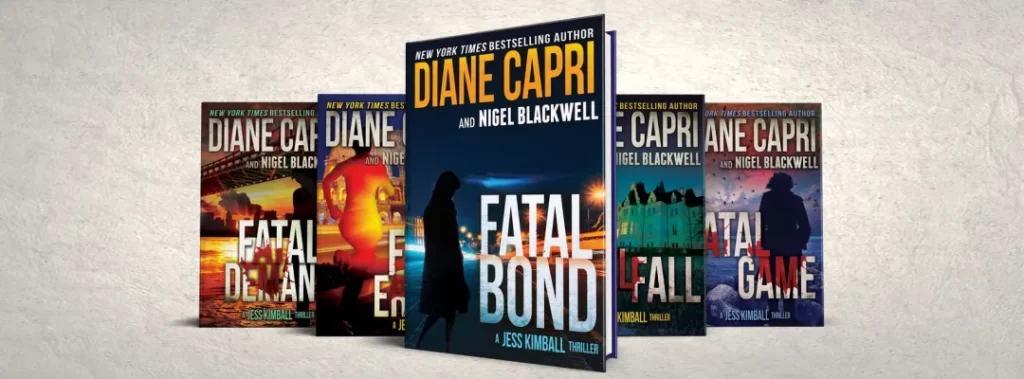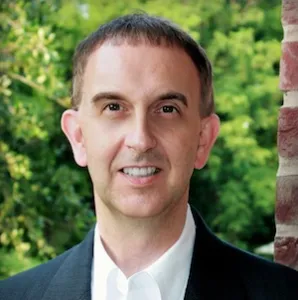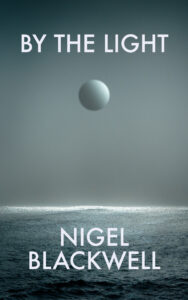Today I’m interviewing author Nigel Blackwell, a fellow member of one of the writing critique groups I’m in.
Nigel Blackwell was born in rural Oxfordshire in England. He has a love of books, a PhD in Physical Chemistry, and a black belt in pointing out the obvious. He is presently working on both short stories with supernatural and mystical elements, and thrillers. By The Light is the first book in this range. In the past he authored Paris Love Match, the story of what happens when an engineer encounters the mob, a bag of diamonds, and a girl to die for— and finds that’s exactly what might happen if he doesn’t think fast.
Collaborating with New York Times best selling author Diane Capri, he wrote the Jessica Kimball series of thrillers. Jess is an investigative reporter with an uncanny gift for putting herself in mortal danger when justice needs to be served. Nigel has driven trains, crashed single seat race cars, and travelled much of the world. He now lives in Texas with his wife and daughter, where they enjoy the sunshine and listen to the coyotes howl at night.
And now, the interview:
Poseidon’s Scribe: How did you get started writing? What prompted you?
Nigel Blackwell: I‘ve loved reading and stories since elementary school, and writing seemed an obvious thing to do, but I didn’t start on full length novels until about ten years ago.
P.S.: Who are some of your influences? What are a few of your favorite books?
N.B.: Wow. Where do I start? In (what Americans would call) middle school, we used to have to read classics such as Sheridan, Shakespeare, and Chaucer (but sadly not the “Wife of Bath’s tale!”). I can’t say I hated them, but at the time HG Wells, AC Clarke, Aldous Huxley, Isaac Asimov and almost anyone else was more interesting. Weirdly, when I read back over my own writing, I think the stiff style of the former set have influenced me as much as the latter.
These days, I’ve added many more influences. Lee Child for the way he’s made a brilliant series that doesn’t feel like soap opera; Michael Crichton for his variety; Greg Bear for his science; F Paul Wilson for his mix of realism with the supernatural, and … well, it’s a big list.
As for books, The Affair by Lee Child is a standout in both style and story, Rendezvous with Rama because of its mystery and portent (Raman’s do everything in threes …), and Pirate Latitudes because (published after Crichton passing) it is a fitting end to a fabulous storytelling career.
P.S.: Is there a common attribute that ties your fiction together (genre, character types, settings, themes) or are you a more eclectic author?
N.B.: Ha, if eclectic is the polite way to say all over the place, then yes, with thrillers, capers, mysteries, and verse, I’m eclectic! That said, what I try for in all my work is close POV with conflict on multiple levels.

P.S.: You’ve collaborated with author Diane Capri on several books in the Jess Kimball thriller series. What was it like to collaborate? How did you split up the work?
N.B.: Diane’s a full-time author. She works very hard on all aspects of the business from concepts and writing to marketing and promotion. That focus certainly helped my productivity! We tried various approaches to collaborating, interleaving chapters for example, but they made for more work. So we settled on a quick first draft which we would cycle back and forth editing. It was a great time, and I’m proud to have worked on the series.
P.S.: You’ve written novels, novellas, short stories, and poems. Do you have a preference among those forms?
N.B.: I prefer to write novels, they give time to explore the characters’ lives and situations. But short stories and verse are good in two respects, they help you focus on what’s essential to tell the story (no getting sidetracked into bunny trails), and they take a month not a year 🙂
P.S.: If you could win a trip to the fictional world of another author, where would you go and what would you do there?
N.B.: As a teen, I wanted to be in Clarke’s 2001—grown up and heading to Jupiter. Now I’m grown up I want to be a teen at Hogwarts. But that’s the great thing about books, they give us the chance to live vicariously. You can travel in time and space meeting new people in faraway places—all at the turn of a page!
P.S.: Your most recent book is By the Light, a collection of novellas, short stories, and poems. Please tell us about it. Is there a common theme?
N.B.: After a string of Jess Kimble thrillers, it was great to write self-contained pieces on different subjects. Most have a touch of the supernatural to them, and a number have an element of ambiguity until the end. For example, the captain (a typically male occupation) in “Sisters” is never said to be female, but for a cryptic comment (“… of no comfort to man. Nor me.”).
P.S.: What are the easiest, and the most difficult, aspects of writing for you?
N.B.: Easiest is the first draft, most difficult is the last. Sadly, that’s more than just humor. It’s easy to come up with ideas, but filling in all the details is hard work. But it’s satisfying when things come together in a scene, and that makes it all worthwhile.
P.S.: If you traveled through time and met yourself at a point when you were first thinking of being a writer, what would you tell this younger version of you?
N.B.: Know the ending before you start.
A book takes readers on a journey. If you simply take left- and right-hand turns hoping to end up somewhere interesting, you might, but most times you won’t. On the other hand, if you decide you’re going to Niagara Falls you can plot the most interesting way to get there. That way the reader feels like the draw of each step inevitably leads to the right conclusion.
P.S.: What is your current work in progress? Would you mind telling us a little about it?
N.B.: I’m closing in on the end of The Devil’s Bible. In WW1, a British mathematician is sent to retrieve a document from occupied France. He finds the document is one of a series of scrolls spread across Europe that will bestow demonic powers. Chasing after them, he discovers a German General is also in the hunt … and the General has a whole army behind him.
Poseidon’s Scribe: What advice can you offer aspiring writers?
Nigel Blackwell: The typical response would be to stop aspiring and write. I’d also say, see question 9 😉
Less flippantly, watching movies is a quick way to pick up story ideas, characters, and locations. But most important is to read. When I started writing novels, I felt reading was a luxury that took me away from the work. But really it’s education, inspiration, and encouragement all rolled into one—mysteries are solved, justice is done, and heroes and heroines save the day. Stories are all about playing with the readers emotions, and is there any better feeling to help put pen to paper?
Thank you, Nigel.
Readers can keep up with Nigel at his website, and on Facebook, Amazon, and Goodreads.



Thanks Steve. It was fun. Cheers Nigel
My pleasure, Nigel. You’re welcome.